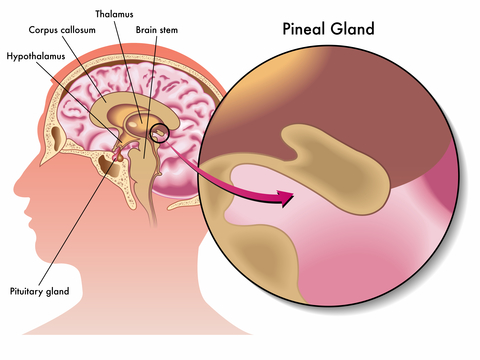Three glands of critical importance to the body, the hypothalamus, pituitary and pineal glands, are all located in the brain.
These glands work synergistically to control many functions in the body.
Many children today experience symptoms because their hormones are out-of-balance or out-of-sync with one another.
Hormones have their individual functions, but they may not be able to do their jobs if they are not in balance or in sync with other hormones in the body.
Any hormone out-of-sync disrupts all the other hormones and their functioning.
Hormones are very complex and sensitive to diet and toxins.
Let’s look at each of these important glands.
Hypothalamus
The hypothalamus is often called the “master gland” because one of its most important functions is to link the nervous system to the endocrine system (hormonal) which it does by controlling the pituitary gland.
The hypothalamus synthesizes and secretes neurohormones that stimulate or inhibit the secretion of pituitary hormones which in turn aids the hypothalamus in controlling:
- Body temperature
- Hunger
- Thirst
- Fatigue
- Emotions
- Growth
- Salt and water (electrolyte) balance
- Sleep
- Weight
- Circadian cycles
- Olfactory (sense of smell) stimuli
- Stress
- Rage
- Survival
- Sexual activity
- Changes in body temperature caused by infection
- Appetite regulating hormones such as leptin and ghrelin, insulin and glucose.
The hypothalamus may malfunction with:
- Anorexia
- Bulimia
- Malnutrition
- Too much iron
- Bleeding
- Head traumas
- Infections
- Inflammation
- Genetic disorders
- Tumors
- Radiation
- Surgery
What supports the hypothalamus?
- Healthy fats
- B vitamins
- Vitamin E
- Glandular support
- Minerals and electrolytes
- Healthy diet
- Eliminating inflammation
Pituitary
Both the hypothalamus and the pituitary glands are tightly connected because the hypothalamus controls the pituitary and between them they secrete 16 hormones.
There are two parts to the pituitary: the anterior and the posterior, and they both function separately from one another.
The major anterior pituitary hormones are:
- Thyroid-Stimulating Hormone (TSH), which regulates metabolism
- Follicle-Stimulating Hormone (FSH) and Luteinizing Hormone (LH), which release estrogen, testosterone and progesterone
- Prolactin (PL), which stimulates the production of milk
- AdrenoCorticoTropic Hormone (ACTH), which stimulates the release of adrenal cortical hormones by the adrenal glands to support stress
- Melanocyte-Stimulating hormone causes increased skin pigmentation
- Human Growth Hormone (HGH) important for growth and development
The posterior pituitary gland stores and secretes two hormones found in the brain:
- Oxytocin (OXT), which is needed for birthing, bonding, socialization, behaviors and emotions
- Vasopressin (VP), which is an anti-diuretic hormone (ADH). Vasopressin:
- Increases water permeability and absorption in the collecting ducts of the kidneys
- Enhances muscle tone
- Enhances peer bonding
- Improves memory
- Improves social behavior
What supports the pituitary gland?
- Sleep
- Amino acids (protein assimilation)
- IGF-1
- Maca root
- Adaptogens
- Glandulars
- Manganese
- Natural full-spectrum sunlight during the day
- Vitamins E, A, D and B
Pineal
The pineal gland is often referred to by mystics as the “third eye.”
The third eye is the connecting link between the physical and spiritual worlds, and one might say the sacred place of extrasensory perception in the brain.
It has certainly been a source of interest and intrigue for mystics and healers for thousands of years.
Today, most doctors understand that one of the reasons the pineal gland is important is because it produces melatonin, which regulates circadian rhythm and induces sleep.
Interestingly, the pineal gland needs darkness to secrete melatonin.
Dietrich Klinghardt MD PhD believes that many individuals with sleep disorders have melatonin deficiency because the pineal gland is not getting enough full-spectrum sunlight during the day, or enough darkness during the evening.
Other factors that influence and disturb the pineal gland’s production of melatonin are:
- Excessive exposure to electromagnetic fields (EMFs)
- Calcification caused by the accumulation of fluoride that leads to the formation of phosphate crystals
The pineal gland also plays a significant role in sexual maturation, seasonal affective disorder (SAD) and depression.
What supports the pineal gland?
- Avoid wearing sunglasses to receive daily sunlight
- Do not expose your eyes to blue lights (from computers, cellphones, tablets, etc.) during the evening hours
- Eliminate endocrine disruptors
- Supplement with:
- Oregano
- Neem oil
- Spirulina
- Blue green algae
- Chlorella
- Boron
- Raw apple cider vinegar
- Vitamin K2
- Fresh organic raw produce to help reduce calcification
Still Looking for Answers?
Visit the Epidemic Answers Practitioner Directory to find a practitioner near you.
Join us inside our online membership community for parents, Healing Together, where you’ll find even more healing resources, expert guidance, and a community to support you every step of your child’s healing journey.
Sources & References
No sources & references currently available.
Resources
No resources currently available.
Related Pages
No related pages currently available.
